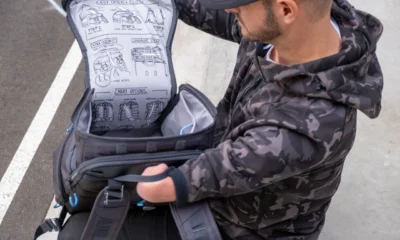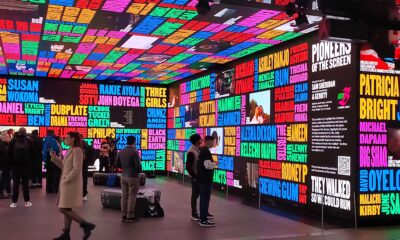Tech
7 Brilliant Disability Hacks for Enhanced Everyday Living
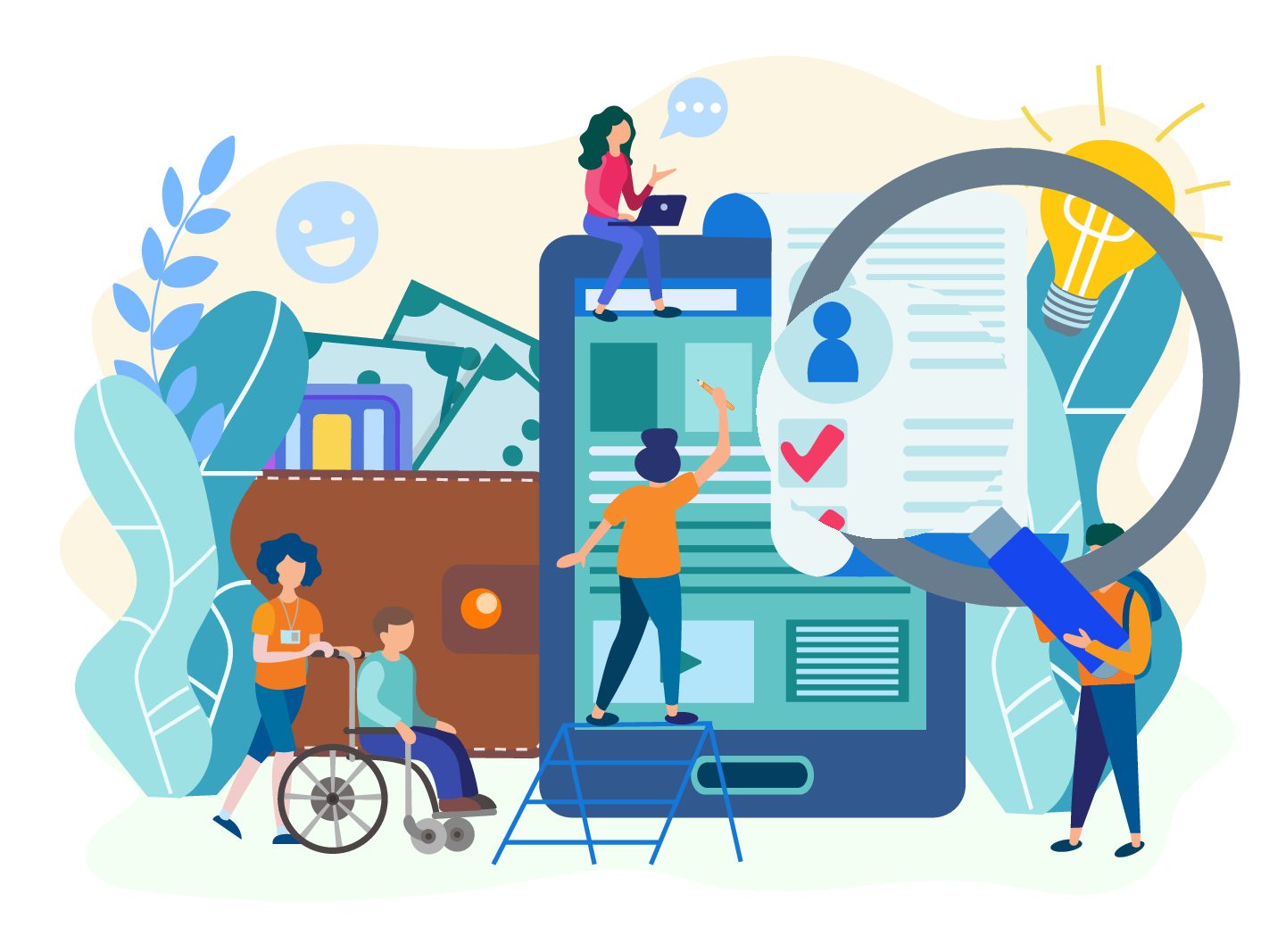
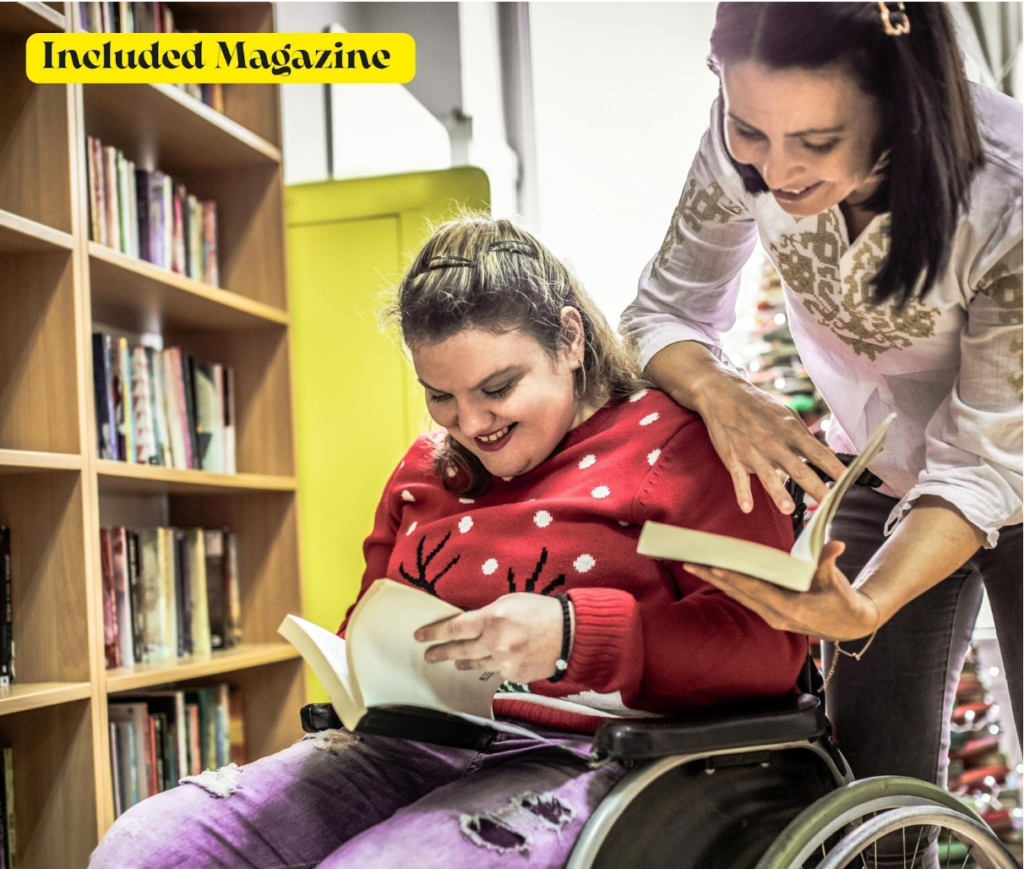
Living with a disability often sparks creativity and innovation, resulting in the creation of ingenious “hacks” that streamline and simplify daily life. In this blog post, we are thrilled to present seven remarkable disability hacks that provide practical solutions to a range of challenges. These hacks not only showcase the resilience of individuals with disabilities but also underscore the remarkable power of human ingenuity to elevate the quality of everyday life.
1. Innovative Kitchen Gadgets for Adaptability:
Cooking is a source of joy for everyone, and adaptive kitchen gadgets enable individuals with disabilities to navigate the culinary world with newfound ease. Tools like one-handed cutting boards, jar openers, and specially crafted utensils promote self-reliance and confidence in the kitchen.
2. Revolutionizing Homes with Voice-Controlled Technology:
The evolution of technology has transformed the way we interact with our living spaces, and voice-controlled smart homes take accessibility to unprecedented heights. From adjusting lighting and thermostats to operating appliances, individuals with disabilities can seamlessly orchestrate their environment using voice commands.
3. Empowering Mobility with Wheelchair-Accessible Vehicles:
Mobility is an essential aspect of life, and adapting vehicles for wheelchair accessibility opens up exciting avenues for exploration. Incorporating features such as ramp systems, lowered floors, and secure docking systems empowers individuals to travel independently, fostering a sense of liberation and adventure.
4. Tangible Solutions with Tactile Identification Tools:
Navigating day-to-day tasks becomes more manageable with tactile identification tools. Raised dots, braille labels, and textured markers facilitate the differentiation of items like clothing, personal care products, and household objects, granting individuals the ability to maintain their routines autonomously.
5. Elevating Recreation with Adaptive Sports Equipment
Participation in sports and physical activities is integral to overall well-being. Adaptive sports equipment, including handcycles, modified racquets, and specialized wheelchairs tailored for specific sports, ensures that individuals with disabilities can partake in both recreational and competitive pursuits.
6. Communication Redefined through Customized Devices:
Communication is a fundamental human need, and customized communication devices cater to diverse communication methods. Augmentative and alternative communication (AAC) devices, equipped with symbols, text, or speech output, empower non-verbal individuals to convey themselves effectively.
7. Harnessing personalized assistive apps:
In the digital age, smartphones and tablets serve as invaluable tools for everyone. Personalized assistive apps, such as screen readers, magnifiers, and cognitive aids, address specific needs, thereby enhancing productivity, communication, and access to information.
These seven remarkable disability hacks serve as a testament to the indomitable spirit of innovation and resilience that individuals with disabilities embody. By harnessing creativity and adaptability, they have devised ingenious solutions that augment their quality of life and promote self-sufficiency. By sharing these hacks, we aspire to inspire others to embrace their challenges and embark on a journey of inventive problem-solving. These innovations are a reminder that limitations can catalyze ingenuity, leading to solutions that not only benefit individuals with disabilities but enrich society as a whole. Let us celebrate these extraordinary hacks and continue our commitment to fostering an inclusive and accessible world.
Featured
How a Robotic Exoskeleton is Helping Paralysis Patients Walk Again
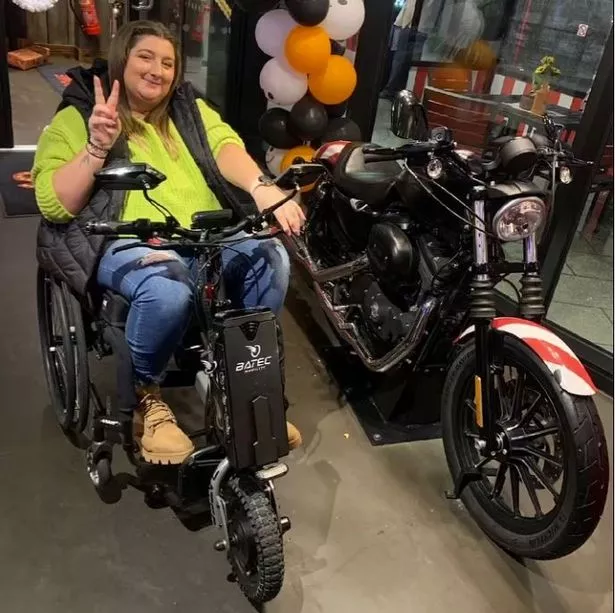
Sophie Shuttleworth, a 32-year-old woman from Newport, has experienced a remarkable transformation thanks to a robotic exoskeleton for paralysis. After contracting viral meningitis in July 2022, she was left paralyzed from the chest down and spent two years relying on a wheelchair.
In January, Sophie began using the exoskeleton during therapy sessions at the Morello Clinic, a local rehabilitation center. The device enables her to stand and move her legs in a natural walking pattern, allowing her to experience the sensation of being upright for the first time in two years. This moment was deeply emotional for Sophie, who described the joy of regaining mobility after such a long period of inactivity.
Beyond the emotional impact, the exoskeleton has provided Sophie with significant physical benefits. It has improved her circulation and bone density—crucial factors considering her diagnosis of osteopenia due to prolonged immobility. Sophie emphasized the mental health benefits as well, comparing the endorphins she now feels when walking to the exhilaration she experienced while swimming, a sport she loved before her illness.
Sophie, along with eight others who use the exoskeleton, is actively fundraising to support its continued availability at the clinic, aiming to raise £50,000 for a year of access to this life-changing technology. Each user benefits uniquely from the device, demonstrating its versatility in addressing various mobility challenges.
Before her illness, Sophie was fiercely independent and even swam 22 miles in a local pool to raise money for charity. While she continues to rely on family support for certain tasks, she is optimistic about the future. The combination of the exoskeleton and her new ground-floor apartment, designed to meet her needs, brings her closer to regaining her independence.
As she navigates this new chapter, Sophie remains hopeful and determined, believing that with continued use of the exoskeleton, she can achieve greater autonomy in her daily life. Her story not only highlights the potential of robotic technology in rehabilitation but also serves as an inspiration to many facing similar challenges.
Tech
Removing barriers to gaming
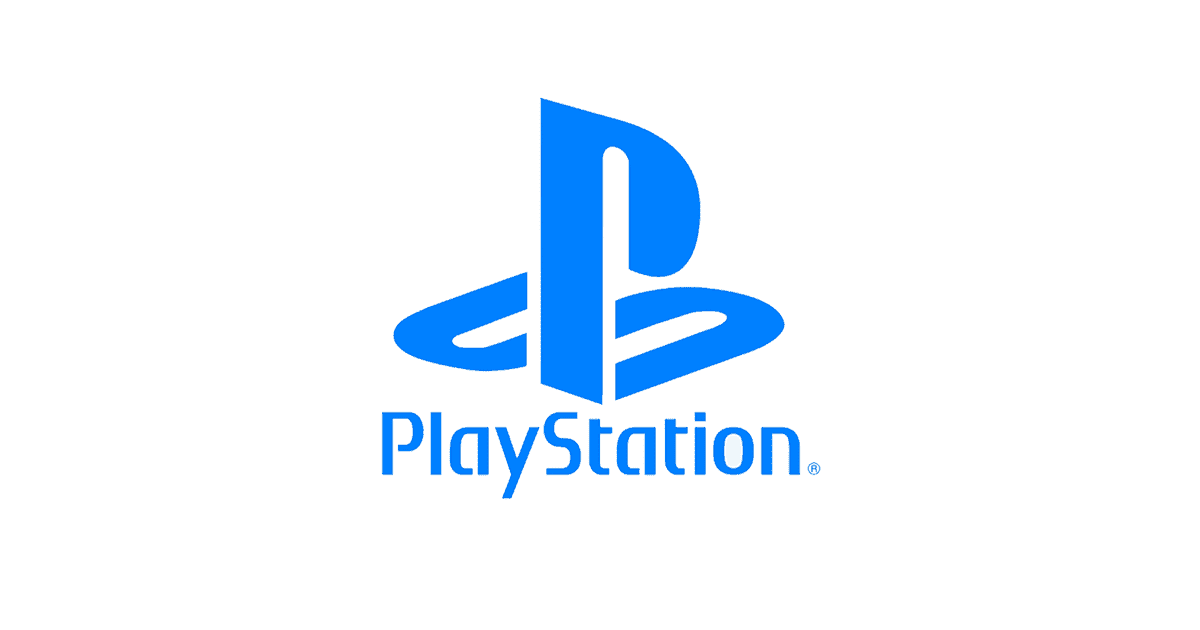
Electronics company Sony has designed a new PlayStation 5 (PS5) controller allowing the disabled gaming community to play more comfortably for longer.
The adaptable PlayStation controller is called Project Leonardo, and is focused on enabling gamers who might have limited motor control to “craft their own play experience.” It gives them the freedom to play with a completely new set of functions they wouldn’t otherwise have access to, which is revolutionary for the disabled community.
Sony asked accessibility experts, PlayStation community members, and game developers to come together to think up this design. Making it customizable was one of the key requirements, as every person who has a physical disability experiences gaming in a different way. This is why the controller has swappable components. Such a smart move.
“We want to empower them [the disabled community] to create their own configurations. The controller can also flexibly accept combinations of accessibility accessories to create a unique aesthetic. I am excited that the design will be completed through collaboration with players rather than presenting them with a single form factor.” So Morimoto, Designer, Sony Interactive Entertainment.
The controller is still in development but keep up to date with Project Leonardo news on the PlayStation blog.
Tech
Air4All enables travel equality for the disabled community
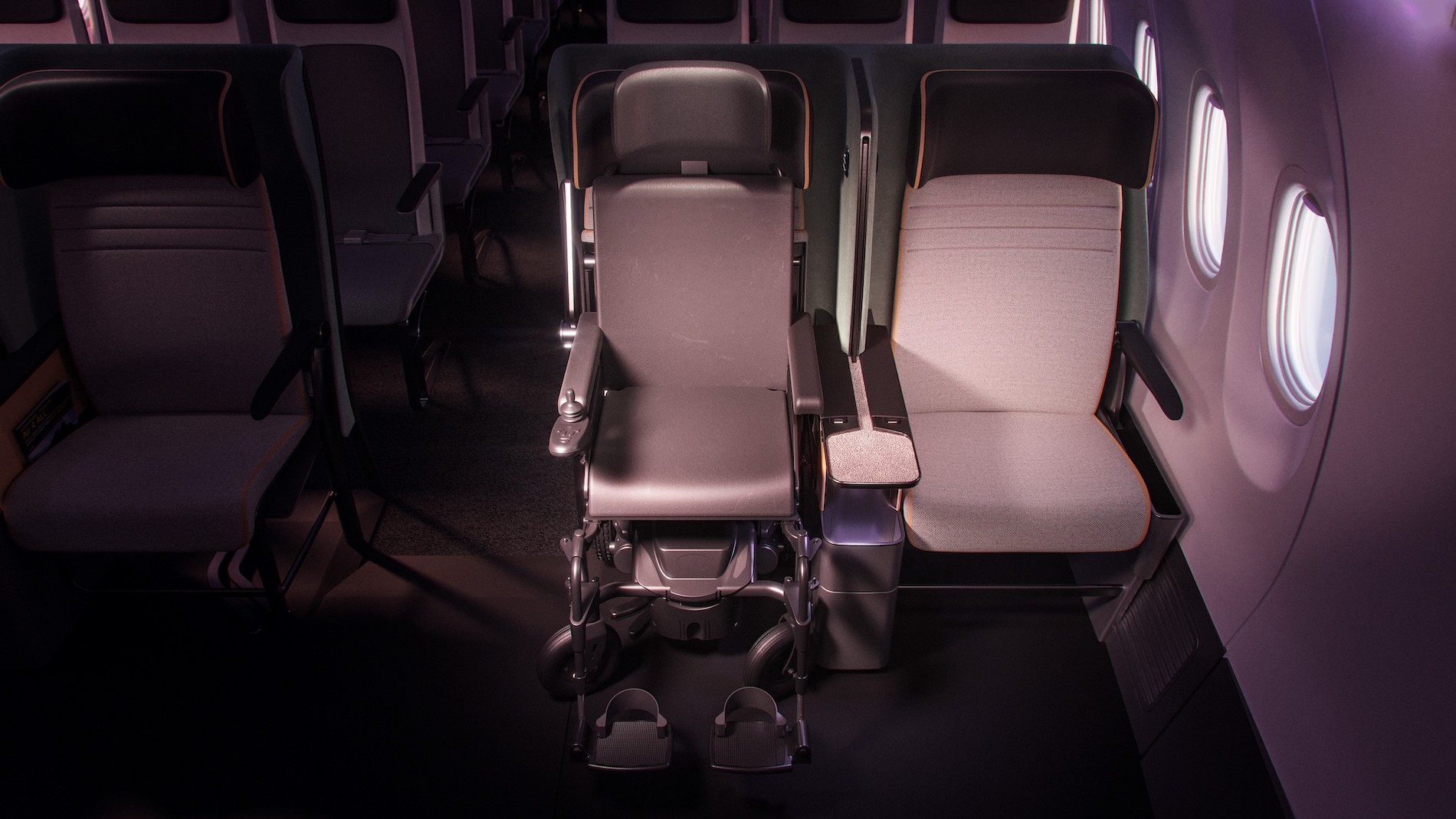
Airline travel can be an ableist space. Moving around busy airports and boarding planes can be overwhelming, especially if you have to get in and out of a wheelchair constantly.
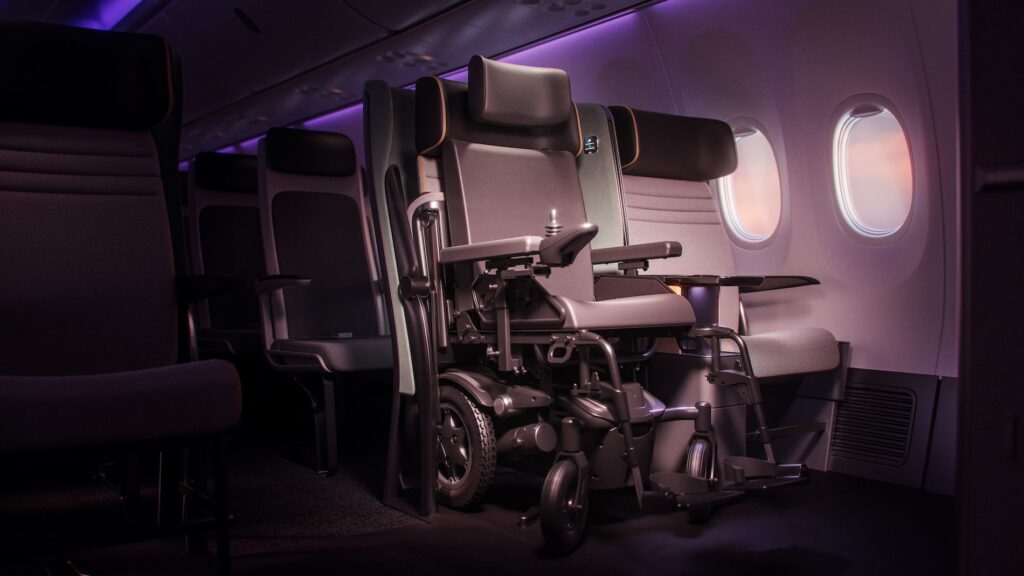
Air4All, is a new, innovative company with an aim to make travel adventures more accessible by enabling power-wheelchair users to board planes while still in their wheelchairs. This is revolutionary as many people with disabilities avert flying because it’s either impossible or such a complex and exhausting process. Not to mention the highly uncomfortable airline seats that are most definitely not designed with any form of disability in mind.
Created by the UK travel design company PriestmanGoode together with the advocacy nonprofit Flying Disabled, the Air4All design gives an airline seat the possibility to fold up and securely lock in a variety of wheelchair sizes in the first row of the plane. What’s incredible is that the Air4All structure doesn’t eat into any able-bodied people’s chair space, making this a win-win situation for the people flying and the brands and companies involved.
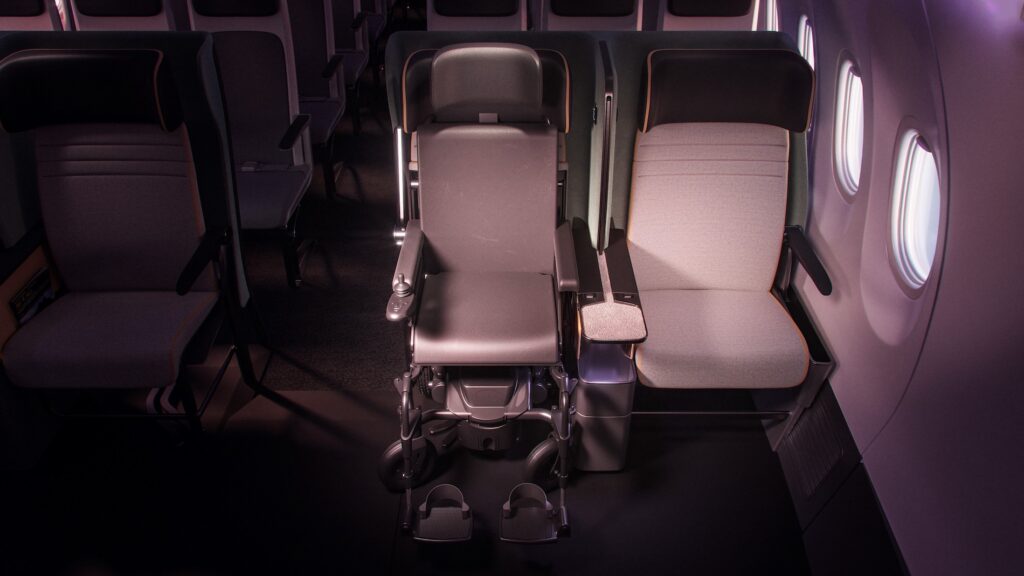
A simple, yet genius idea, it’s a wonder why it’s taken until now to bring this idea to the fore. While Air4All is currently working with the airline industry to bring it into mainstream territories, let’s hope it gets approval sooner rather than later. A more inclusive travel experience awaits once it does.



